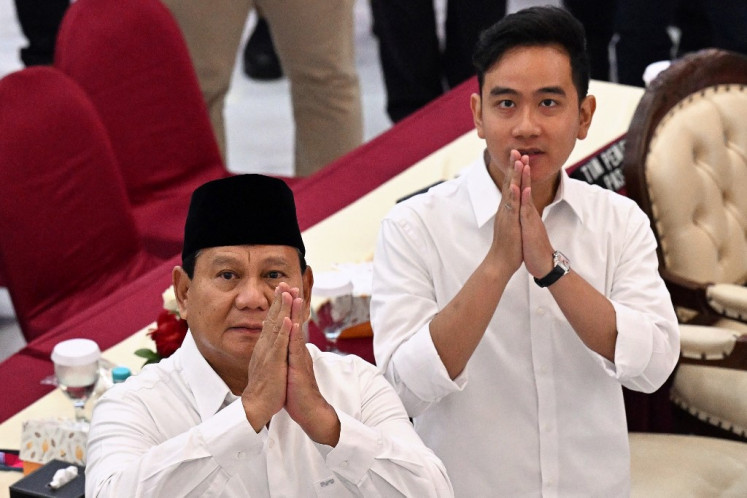A turning point in Indonesia’s tax treaty history
Done deal: Finance Minister Sri Mulyani Indrawati (left) and Organization for Economic Cooperation and Development (OECD) secretary-general Angel Gurria sign a multilateral instrument on tax treaties at the OECD headquarters in Paris
Change Size

D
one deal: Finance Minister Sri Mulyani Indrawati (left) and Organization for Economic Cooperation and Development (OECD) secretary-general Angel Gurria sign a multilateral instrument on tax treaties at the OECD headquarters in Paris. Through the MLI, Indonesia aims to combat tax base erosion due to the improper use of tax treaties. (Courtesy of Sri Mulyani Indrawati)
According to the Organization for Economic Cooperation and Development (OECD), US$100 billion to $240 billion is lost to tax avoidance every year through the abuse of legal loopholes, or 4 to 10 percent of the world tax revenue.
On a global scale, multinational corporations (MNCs) use tax planning strategies that exploit legal gaps and mismatches in tax rules to artificially shift profits to low or no tax locations where there is little or no economic activity, so they pay little to no corporate tax.
Taxpayers can take aggressive tax planning measures by accessing certain tax treaties that provide lower rates or tax exemptions, one way of which is to create an “intermediate company” in the relevant country. A tax treaty is basically agreed to avoid double taxation by allocating taxing rights, as well as to increase economic cooperation.
However, taxpayers often use the facilities offered in tax treaties to avoid paying tax altogether, a practice that is called “treaty shopping”.
The government on Nov. 12, 2019, ratified the Multilateral Convention to Implement Tax Treaty Related Measures to Prevent Base Erosion and Profit Shifting (MLI) through Presidential Regulation No. 77/ 2019. Ratifying the MLI reflects Indonesia’s commitment to combat tax base erosion due to the improper use of tax treaties.
The government, along with 78 other countries, signed the MLI on June 7, 2017, in Paris as part of a global effort to implement the entirety of the international base erosion and profit shifting action plan related to tax treaties.
The MLI will enter into force within three months after Indonesia submits its instrument of ratification to the OECD.
_______
"Ratifying the MLI reflects Indonesia’s commitment to combat tax base erosion due to the improper use of tax treaties."
______
Once in force, the tax treaty measures in local regulations will be updated in compliance with the international tax rule and lessen opportunities for tax avoidance by MNCs. Taxpayers will no longer be able to avoid taxation as a result of the anti-tax avoidance provisions on tax treaty abuse.
The process of drafting the MLI is unique in international agreements. Upon signing the MLI, the signatory country must provide documents to the OECD regarding the tax treaty partner countries it has selected as its MLI partners and the provisions it has used to modify the relevant tax treaty. The MLI will take effect only if countries are mutual partners and the treaty provisions match.
Indonesia currently has 70 effective tax treaties and has chosen 47 countries as its MLI partners. However, only 39 of these 47 countries have been confirmed as Indonesia’s MLI partners in January 2020.
Of the remaining eight, six countries — Brunei Darussalam, Laos, the Philippines, the United States, Thailand and Vietnam — have not signed the MLI, and the two others, Switzerland and Norway, did not choose Indonesia as a MLI partner.
The anti-tax avoidance provision that is to be automatically added to Indonesia’s tax treaties with these 39 countries is the principal purpose test (PPT). The rule provides a general mechanism for addressing cases of treaty abuse, including treaty shopping and certain conduit financing arrangements that are not covered by more specific anti-tax avoidance rules.
The PPT applies to all cases of treaty abuse. If one of the principal purposes of a transaction or arrangement is to obtain treaty benefits (e.g. a lower withholding tax in the case of treaty shopping), these benefits would be denied under the PPT unless it is established that granting these benefits would be in accordance with the object of the treaty provisions.
Adopting the PPT is very important for Indonesia to prevent treaty shopping.
Before the MLI, treaty shopping was widespread and extensive due to the absence of an anti-avoidance rule in tax treaties and in the Income Tax Law. The inclusion of the PPT in tax treaties will prevent cases of treaty shopping and the treaty benefits can be given to those entitled taxpayers and toward increasing overall investment and economic growth.
Because the impact of the MLI will be different for each tax treaty, the government needs to prepare a consolidated version that will facilitate tax authorities and taxpayers in applying the MLI. In addition, rapid policy formulation and business support must be anticipated to establish fair taxation and meet the global standard for all taxpayers.
_________
The writers are international tax analysts, Fiscal Policy Agency, Finance Ministry. The views are personal.









